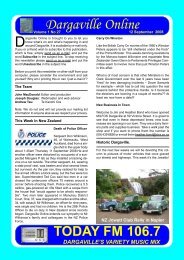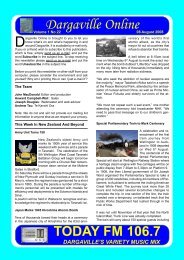The Kaipara Konnection - Kaipara Konnection - Dargaville.BIZ
The Kaipara Konnection - Kaipara Konnection - Dargaville.BIZ
The Kaipara Konnection - Kaipara Konnection - Dargaville.BIZ
Create successful ePaper yourself
Turn your PDF publications into a flip-book with our unique Google optimized e-Paper software.
Faith is taking the first step, even when<br />
you don’t see the whole staircase. -- Martin Luther King Jr.<br />
4 March 1855 Legendary sheep rustler James Mackenzie caught<br />
In 1855 James Mackenzie became one of New Zealand’s most enduring folk heroes. On 4 March he was caught in a<br />
pass in the upper Waitaki River basin with 1000 sheep that had gone missing from the Levels station, north of Timaru.<br />
While Mackenzie was in possession of the sheep, there were tracks belonging to several other men. He denied the<br />
theft, claiming that he had been hired by John Mossman to drive the sheep to Otago. Mackenzie escaped and walked<br />
160 km to Lyttelton, where he was recaptured on 15 March. In April he was found guilty by a Supreme Court jury and<br />
sentenced to five years’ hard labour.<br />
Mackenzie escaped from his road gang in May and again in June 1855, for only a few days each time. He was placed in<br />
irons and carefully watched. In September a new resident magistrate at Christchurch investigated Mackenzie’s case and<br />
found flaws in both the police inquiry and the trial. As a result Mackenzie was pardoned in January 1856. He probably<br />
returned to Australia, but nothing certain is known of his later life. He left his mark on the South Island high country,<br />
though. <strong>The</strong> significance of the pass where he was discovered with the sheep, and of the pastoral country it led to, were<br />
quickly appreciated by pastoralists. <strong>The</strong> region was subsequently dubbed the Mackenzie Country.<br />
A later biographer, Cathy Marr, says that ‘Mackenzie’s exploits won him the admiration of those on the margins<br />
of society’. He was a hero to many would-be farmers of small means. Those who resented the power of wealthy<br />
landowners also identified with him, and his rebellious spirit inspired many who did not<br />
fit easily into genteel Canterbury society. His pardon won popular sympathy in a frontier<br />
society still engaged in establishing its social and political norms. His life took on legendary<br />
proportions. His almost superhuman strength and a ‘fabulous’ dog saw him held up as<br />
shepherd, drover and thief extraordinaire.<br />
Image: notice of reward for capture of James McKenzie in the Lyttelton Times<br />
8 March 1929 First ‘talkie’ draws huge crowds in Wellington<br />
Moviegoers flocked to see Frank Borzage’s Street angel, a silent picture with a recorded musical soundtrack, at<br />
Wellington’s Paramount <strong>The</strong>atre. <strong>The</strong>re were also five ‘talkie shorts’, including an interview with the King of Spain. Silent<br />
movies were usually accompanied by live music, so a recorded soundtrack was a real novelty.<br />
Street angel told the story of a ‘spirited young woman’, Angela (Janet Gaynor). Down on her luck and living on the<br />
streets, she joined a travelling carnival, where she met a vagabond painter, Gino (Charles Farrell). Gaynor won the Best<br />
Actress Oscar for her performance.<br />
<strong>The</strong> first feature-length movie originally presented as a talkie was <strong>The</strong> jazz singer,<br />
released in the United States in October 1927. Not all were convinced by the new<br />
technology. United Artists president Joseph Schenck asserted in 1928 that the new talkies<br />
were just a passing fad, but by the following year virtually every American film had a<br />
recorded soundtrack. <strong>The</strong> first New Zealand-made talkie screened in January 1930 and<br />
by the early 1930s they were a global phenomenon.<br />
Image: Janet Gaynor in a scene from Street angel (IMDB)<br />
Reference: New Zealand History Online
















